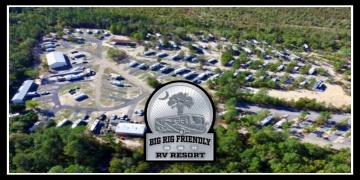Name of Blog
RV Tips Blog
Camping Tips Blog

How Do You Properly Level your RV?
10-08-2018Author :Carrie Todd in Education
Uhh-Oh—the RV is crooked. It looks odd from the outside, but the inside is nearly impossible to tolerate. Items are sliding and rolling off the counters. Plus, walking is difficult. Although many campgrounds invest in concrete pads to provide level places to park, if the RV park has un-level gravel or grass sites—or you are boondocking—you'll have to make some adjustments.
One of the things that makes your rig more like a traditional home and less like a vehicle is
properly leveling it. This simple action is also necessary to keep your RV in working condition if you're parked on uneven ground. There are different techniques for the various systems, but generally, the steps are the same.
Why It's Important to Level Your RV
Of course, you would prefer your rig remain balanced for the personal comfort of you and your companions. However, it is actually very important that your RV is level, as to neglect this can result in several hazardous and potentially costly problems. For example, it could damage the chassis and undercarriage, as well as the tires. (In fact, improperly leveling your coach or camper can also cause undue wear on the tires.) In a worst-case scenario, it could result in your RV sliding down a hill or even tipping over.
Related Read: House vs Chassis
Another part of your home-on-wheels that could develop issues from being un-level is your refrigerator. Most have to be stable and balanced so the chemicals flow, allowing them to operate properly. Failure to do so can cause them to malfunction and ultimately stop working entirely. The fridge is likely the most expensive appliance in the rig.
Look for a Level Campsite
One of the first things you can do to avoid any problems is park your motorhome or trailer on a level surface to begin with. Depending on the RV park and the number of spots they have available, you may or may not be able to choose for yourself. When possible, check the spot before committing to it.
Take a walk around the area to get an idea of which corners will need to be addressed. Use a bubble level or a smartphone app to check for levelness before you unhitch a travel trailer from your truck or hook up. If the spot isn't too bad—or you don't have any choices—you will use your jacks or blocks to balance it out.
If you’re fortunate, your RV will have electric or hydraulic levelers and stabilizers built-in. If you’re parking on a soft surface like dirt or grass, it's a good idea to place blocks under the feet of the jacks for more secure stabilization.
Set whatever leveling device—or app on your phone—you are using in a central location. Then engage your jacks until they reach the blocks. Level your RV side-to-side and then front to back. Periodically check your leveling device to make sure that the floor is becoming more balanced. If you have a bubble level on your refrigerator, check that too.
If your RV is equipped with a built-in leveling system, it is a good idea to have them checked when you have your PM (periodic maintenance) done. If they aren't working properly, it is much easier to get them handled then, than it is when you're farther down the road.
Related Read: Self Leveling System Not Working? Here's what you can do...
Level Your RV with Blocks
Even if you do have an automatic stabilization system, having a few leveling blocks is a good additional step. They can provide an extra boost if you're staying at a particularly unlevel campsite. Plus, if your hydraulics fail during an excursion, the RV blocks could be a (practically) a life-saver. If your travel trailer or motorhome is not equipped with power jacks, you'll need to level it the "old-fashioned" way.
(Don't feel bad, though. Honestly, the more bells and whistles your rig comes with, the more things could go wrong and the more it costs to fix them.)
Begin by placing your RV a few feet from where you intend to park it. Take a walk around the area to get an idea of which corners will need to be addressed the most. Keep in mind that if your rig only has stabilizer jacks, they won't help you level it; they only minimize bounce.
Manufactured leveling blocks are available at many big box, camping, and RV stores. They are generally regarded as superior to wooden planks. First, they fit together so you can "build" your desired height from the 1-inch increments. They are resilient, so they aren't likely to split like wood might. Lastly, they are wide enough that your tires won't be hanging over the edges, which can cause major wear on the tire. Also, if the tires don't sit fully on the blocks, the steel belts inside might get bent. This can result in a dangerous blowout on the road.
Place your blocks on the downhill side of where your tires will be. Release the brakes and see if gravity and the idle of your engine will roll your vehicle onto the blocks. If not, slowly pull up onto them. If it is a back-in spot, it might be necessary to place the blocks behind the tires and back onto them. A second pair of eye is helpful for this. If you don't have a copilot, the campground manger or a conscientious neighbor might volunteer. Keep at least one tire on the ground in order to keep the RV secure.
Keep an eye on your leveling device of choice to determine how accurate you are. You might need to try a couple of times to get it right.
The purpose of the stabilizing jacks is to reduce the weight on the trailer suspension and keep it from bouncing when people are moving around inside. If your rig is equipped with them, you should use the front leveling jacks to level it, stabilize it, and minimize bounce. Then extend the rear stabilizers just far enough to reduce any rocking. Don't raise the entire RV off the ground; that can damage it, as well as the jacks.
In Conclusion
Finish by checking your wheels before unhitching your travel-trailer or fifth-wheel and hooking up. With a stable, level RV, you don't need to worry about damage to your refrigerator. You won't be stumbling around in the dark, and you'll be able to sleep more soundly. Additionally, you won't feel like you're living in a fun house. You will have a safe, secure, and comfortable stay.
Comment

Author : Carrie Todd
Initially, Carrie became a freelance writer, editor, and artist to support herself doing something she loves that also allows her to travel. Living in her Tourmaster coach, she has spent no more than five months in one place since October 2013. This ensures that she gets to experience the constantly changing scenery that accompanies the yearly seasonal changes, as well as meet new people across the country. She has since become a LuLaRoe Independent Fashion Consultant, as well to further this endeavor. In fact, Carrie considers herself fortunate, as most people have to be of retirement age to enjoy the sort of freedom she has, with every day bringing something different.
Related Blogs

Navigating the Transition from Urban to RV Living
Embarking on a journey from urban to RV living is a thrilling endeavor, filled with promises of freedom and boundless exploration. This lifestyle switch brings a unique chance to disconnect from the rush of city life and plunge into ...

Families Flock to Big Rig Friendly Resort in SC

Internet Options for RVers to Stay Connected
To RVers, the open road and ever-changing landscape provide unparalleled freedom and adventure. However, this lifestyle also brings unique challenges, especially when staying connected. There are plenty of reasons why reliable intern...




